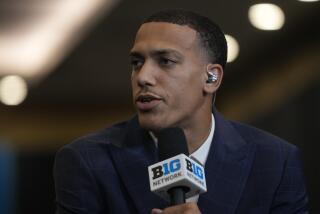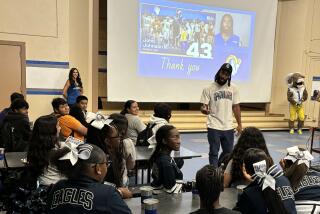Magic Johnson’s Career Ended by HIV-Positive Test : Sports: The announcement stuns his public. The Lakers star emphasizes that he does not have AIDS. ‘I plan to go on living for a long time,’ he says.
With an announcement that stunned the nation, Earvin (Magic) Johnson, the brilliant guard who was the marquee name for the Lakers and the National Basketball Assn. for 12 years, retired Thursday, saying he had tested positive for the virus that causes AIDS.
Johnson, 32, was characteristically upbeat when he made the announcement at a packed press conference at the Forum in Inglewood.
Flashing his trademark smile, he stressed that while he is infected with the human immunodeficiency virus, he has not developed AIDS. Johnson said he intends to remain active in basketball off the court and that he will become a spokesman for AIDS prevention.
“I plan to go on living for a long time. . . ,” he said.
“I’m going to be a spokesman for the HIV virus. I want young people to realize they can practice safe sex. Sometimes you’re a little naive about it and you think something like that can never happen to you. It has happened but I’m going to deal with it. My life will go on. Life is going to go on and I’ll be a happy man.
”. . . It’s another challenge, another chapter in my life. My back is against the wall. I think you just have to come out swinging and I’m swinging.”
In another development, Johnson’s agent, Lon Rosen, said that Johnson’s wife, Cookie, is seven weeks pregnant. Doctors, however, have said that because she has tested negative, the expectation is that the baby will not be infected with the virus.
Johnson led the Lakers to five NBA championships in his 12 years with the team but his contagious personality and famous smile, his extraordinary poise and maturity stamped him as a once-in-a-generation figure whose popularity transcended the game.
The self-described shy youngster from Lansing, Mich., is one of the biggest stars in a city rife with celebrity. He is a role model to youngsters, a pal of movie stars and entertainment executives, a promoter of charity and a one-man worldwide commercial enterprise he calls “Magic Inc.” His fame is international. Last month, crowds in Paris chanted his name when the Lakers played two exhibition games there.
His announcement riveted the attention of Southern California Thursday and reverberated across the nation.
“I’m devastated. All the wind went out of my lungs when I heard,” Steve Lowe, 46, a lawyer in the mid-Wilshire district, said in a sentiment echoed across the Southland. “Why him ? He’s been the best part of living in Los Angeles in the ‘80s.”
All three television networks led their evening news programs with the announcement. At Madison Square Garden in New York, Johnson’s longtime coach, Pat Riley, now coach of the New York Knicks, asked the crowd for a moment of silence while he recited the Lord’s Prayer.
AIDS experts predicted that Johnson’s forthright discussion of his condition would raise consciousness about the disease and make a difference in the efforts to conquer it.
“I hope that Americans everywhere will understand better today that AIDS is not a remote disease that only strikes ‘someone else,’ ” Dr. Louis W. Sullivan, secretary of Health and Human Services, said in a statement. “Everyone must be aware that the AIDS epidemic can reach them. I am very heartened by the announcement that in the months and years ahead, Magic Johnson will help carry a life-saving message to young people across our nation.”
At the Forum, Laker physician Michael Mellman said, “We have witnessed . . . a courageous act by a very special person. He is not compelled by any legal description or legal requirement to disclose what he has disclosed today. . . .
“Because of his presence and potential impact on society, with a situation that is not only serious but from which we are all at risk, I think he should not only be commended but held as a modern-day hero.
“This is a very, very special person and a very special admission.”
Johnson said he learned of his infection through an examination for an insurance policy, and that his wife of seven weeks, Cookie Kelly, has tested negatively for the virus. He did not discuss how he might have contracted the virus.
Many people infected with HIV live many years with few serious effects on their health. The average period between infection with the human immunodeficiency virus and diagnosis of full-blown AIDS is now 10 years, according to experts. After that diagnosis, new treatments have extended the average patient’s survival to several years.
“Earvin Johnson has been infected with the HIV virus,” Mellman said. “He does not have AIDS. . . . There’s no immediate effect on his life other than we have advised him to avoid those activities which can further impair his immune system, which is playing professional basketball.”
Mellman said Johnson is not on medication but that the issue is being discussed. The typical drugs used to treat HIV infection are AZT and DDI, both of which can have side effects that could impair Johnson’s ability to play basketball.
Johnson said he had called his best friends in basketball, including Larry Bird, Isiah Thomas, Michael Jordan and Riley, to tell them. He told his teammates in the Laker dressing room before the press conference.
With that, one of the brightest of storybook careers ended.
As a 19-year-old sophomore in 1979, Johnson led his hometown university, Michigan State, to a national championship.
A year later, he was in the NBA finals. In the sixth game of that series, at Philadelphia with star center Kareem Abdul-Jabbar injured, Johnson jumped center, played three positions and scored 42 points with 15 rebounds and seven assists, claiming a championship and certifying himself a basketball legend at 20.
He was an all-star in 11 of 12 seasons, missing only because of a knee injury.
He played in nine NBA finals and on five championship teams.
He was a three-time most valuable player and three-time MVP of the finals.
Johnson and Bird, of the Boston Celtics, entered the league the same year, battled each other in numerous championship games and brought the popularity--and ticket and television revenue--of NBA basketball to new heights.
He leaves as one of the most beloved players in history. His endorsement income--an estimated $9 million a year--dwarfed his Laker salary of $3.1 million.
His friends and advisers include some of the most powerful men in Hollywood, among them Joe Smith, president of Capitol Records, and Michael Ovitz, head of Creative Artists Agency. Ovitz set up the deal through which Johnson bought a one-third partnership in a Pepsi-Cola distributing plant.
“To me, he’s the biggest and most recognizable star in this town,” Joe Smith once said.
There can be no doubt Johnson got the most from his career and enjoyed it.
“Basketball is going to be all I dreamed of,” he said last summer. “I never thought all this would happen.
“You find out about the bad things but they don’t compare to the good side: being in the finals . . . playing Boston . . . having that intensity. I mean, there’s nothing that can replace that. Nothing. I mean, I’ve been hurt--fingers, knees. That’s nothing. Because when you watch those films, you go back to Philly, you go back to the (1980) championship.
“It’s scary when your dreams come true.”
Johnson twice broke engagements to Kelly, saying the press of business made him too moody during the season, vowing to wait until his career was over. He changed his mind and they were married Sept. 14 in Lansing, with Thomas and another Detroit Piston, Mark Aguirre, among his groomsmen.
Two weeks later, he joined the Lakers in an exhibition season that took them to Paris. Returning home with the team, he played in his last two exhibitions Oct. 22 and 23. Two days later, he flew to Salt Lake City but felt ill and returned home.
Laker officials, including coach Mike Dunleavy, said as recently as Monday they were hoping for Johnson’s return this weekend.
However, Laker doctors, who cleared Johnson to begin working out, kept his regimen light.
Word of the press conference leaked out early Thursday afternoon and reporters and fans converged on the Forum.
Basketball notables gathered from around the country at the press conference. NBA Commissioner David Stern flew in from New York. Johnson’s former teammates Abdul-Jabbar and Michael Cooper also attended. Local television stations broke into programming to show it live.
Characteristically, Johnson convened the press conference personally, thanked everyone for attending and laughed his way through it.
“I want to thank Kareem,” Johnson said. “We stood side by side and won a lot of battles.
“I told Coop and Kareem, I’ll be calling them so we can play one-on-one. We’ll have some fun. I just won’t be part of the Lakers.
“I’m going to miss it. I’m going to miss coming in at 5 o’clock (before games), saying hello to the security people, the ushers. Getting to see you guys (reporters) at 6 o’clock: ‘Magic, what about this, what about that?’ I’ll miss that. I’ll miss the battles and the wars but most of all I’ll miss the camaraderie with the guys. . . .
“The only thing I can do is have a bright side. If I slipped, then it might be over. Then I’m down, out. I can’t be like that. I never have been.
“Just like I want everybody to be. This is not my-life-is-over because it’s not.”
Nor is he limiting the scope of his ambition. He said he will still pursue his oft-stated goal to buy an NBA team.
“You might interview me next time in Dr. (Laker owner Jerry) Buss’ office,” he said, laughing. “As soon as he moves out, I’ll move in.”
More to Read
All things Lakers, all the time.
Get all the Lakers news you need in Dan Woike's weekly newsletter.
You may occasionally receive promotional content from the Los Angeles Times.






